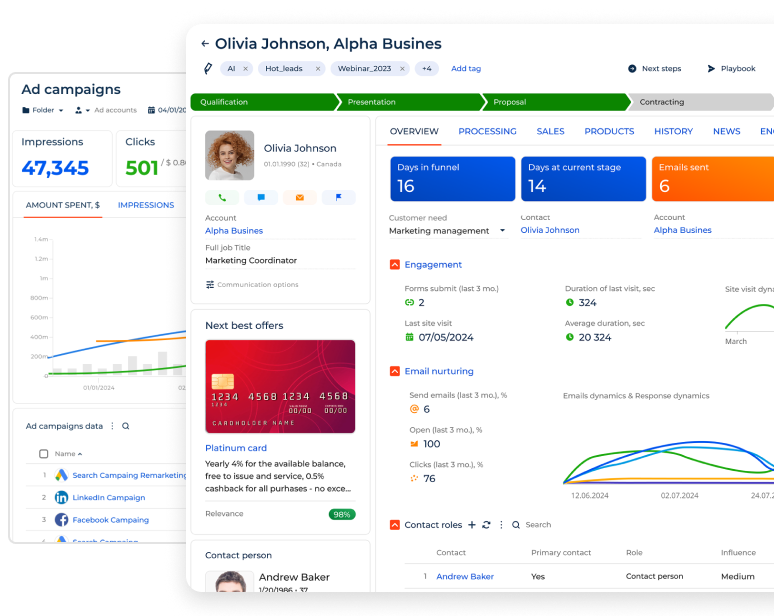-
No-Code
Platform
-
Studio
No-code agentic platform delivering the fastest time-to-value and the highest ROI
-
Studio
-
AI-Native CRM
CRM
-
AI-Native CRM
New era CRM to manage customer & operational workflows
CRM Products -
AI-Native CRM
- Industries
- Customers
- Partners
- About
Best CRM Software for Insurance Agents: Full Guide with 9 Best CRM’s Inside
Updated on
January 22, 2026
16 min read
Deliver Personalized Experiences. Win Loyal Clients With Creatio

Perhaps more than in any other industry, insurance providers’ success depends on their relationships with customers. According to Coveo, just two negative interactions are enough for most customers to turn to a competing insurance business. That's why exceptional customer service is vital in the insurance industry.
Yet, many insurance agents struggle to provide truly exceptional experience. Nowadays, insurance clients expect a seamless, connected, and personalized experience across both digital and in-person interactions. Meeting these expectations provides real business value – Accenture reports that insurers offering personalized services can increase customer engagement by as much as 89%.
It is clear that the traditional approach to client relationships, often marked by siloed and fragmented communication, is contradictory to business growth. A modern customer relationship management (CRM) system is the key to meeting and surpassing customer expectations.
Advanced insurance CRM platforms enable a level of hyper-personalization and seamless service that was once unimaginable in the insurance industry. They provide a centralized, frictionless experience from the very first touchpoint through lifelong client retention.
This article explains how insurance professionals benefit from a modern insurance CRM solution and recommends how to choose the best CRM system for your insurance business.
Key takeaways
- Insurance CRM software helps manage client relationships and support industry-specific processes, including claims processing, policy administration, underwriting, compliance, and document management.
- AI agents and intelligent automation are increasingly important, enabling CRMs for insurance agents to automate case routing, workflow execution, client communication, and analytics across departments.
- Insurance CRMs offer multiple benefits, including stronger customer relationships, improved productivity, higher client retention, and greater profitability.
- To choose the right insurance CRM, you should consider business needs, customization, and scalability options, check integration capabilities, and assess the total cost of ownership.
- The best CRMs for the insurance sector include Creatio, Salesforce, HubSpot, Zoho, Insureio, Pipedrive, FiveCRM, Insly, and AgentCubed.
- General-purpose CRMs (e.g., Salesforce, HubSpot, Zoho, Pipedrive) often require extensive customization or additional products to meet insurance needs, while insurance-focused or composable platforms (e.g., Creatio, Insureio, Insly) provide broader out-of-the-box support for insurance workflows.
What is an Insurance CRM?
An insurance CRM (Customer Relationship Management) system is software designed for insurance businesses to help manage customer data effectively and streamline essential insurance processes, such as underwriting, claim processing, and document management. CRM insurance systems also provide tools for marketing and sales automation, as well as customer service management, in a single platform. CRM software enables insurance agents to leverage client data and automate interactions across multiple channels to deliver personalized service.
Pro tip
An insurance CRM that incorporates AI agents could automate this interaction with a chatbot, reserving human representatives for more complex cases.
Why Insurance Agents Need CRM Software
Insurance agents face many challenges when building client relationships, which are often caused by insufficient data and disconnected tech stacks. A modern insurance CRM helps overcome these obstacles by streamlining operations, improving data-driven decision-making, and ensuring seamless collaboration across teams.
1. Disjointed customer journeys
Does your sales team have to ask the same questions repeatedly when following up with leads? Do customer service managers waste time searching across multiple systems to find policy information before they can assist a customer? These are common symptoms of fragmented customer data.
Without a centralized insurance CRM system, customer interactions become frustratingly inefficient. A CRM for insurance agents provides a 360-degree view of each customer, consolidating all their information and interactions in one place for front-facing teams to consult. This unified view of all the client data ensures a smoother experience for both your team and your clients.
2. Slow manual processes that hinder productivity
Time-consuming but simple manual tasks, such as updating customer data, assigning cases, requesting relevant documents, and searching for case-related details, waste your employees' time.
An insurance CRM system can easily automate these routine tasks, allowing your employees to focus on what matters most - building relationships and closing deals.
3. Missed opportunities for lead generation
A lack of centralized and comprehensive data can prevent you from identifying leads and upselling opportunities.
Moreover, when data is siloed across marketing, sales, and service teams, it becomes difficult to identify what needs improvement and how to optimize lead-generation efforts for better results.
A CRM for insurance agents enables you to track customer behavior, preferences, and needs, and proactively engage with the right prospects at the right time.
4. Low customer retention
When processes are inefficient and interactions feel disjointed, customers are more likely to change providers. Insurance CRM ensures consistent and personalized communication, making it easier to nurture client relationships and improve retention rates.
5. Staying ahead in the competitive insurance market
Insurance agents face high competition in the market, making it difficult to retain clients. Thousands of companies compete for the same clients using similar products and sales approaches. CRM insurance software helps agents stand out by enabling more personalized, timely, and consistent customer interactions.
Benefits of Using CRM for Insurance Business
Streamlined communications
According to the research by PWC, nearly half of insurance customers expect round-the-clock support. Insurance agent CRM software provides contact management features that synchronize client communication channels like email, calls, and social media, enabling insurance agents to track all client interactions. This ensures a cohesive customer experience and reduces miscommunication.
Increased customer satisfaction
According to Accenture, offering personalized services can boost customer engagement by 89%. An insurance CRM allows businesses to gather and store detailed information about their customers, including preferences, purchase history, communication preferences, and feedback. With this data, insurance agents can personalize interactions, tailor offers, and provide relevant recommendations, enhancing the overall customer experience.
Enhanced productivity
Insurance CRMs streamline numerous processes that are both time-consuming and susceptible to human errors. It automates repetitive manual tasks, such as data entry and follow-ups, freeing insurance agents to focus on core responsibilities, including policy sales and managing client relationships. This automation significantly boosts productivity levels.
Better decision-making
A CRM system plays a pivotal role in empowering insurance agents to organize customer data and extract actionable insights, enabling them to refine and enhance their sales strategies.
CRM software for the insurance industry offers customizable dashboards that present real-time information, allowing agents to stay updated with the latest trends, customer preferences, client communication, and market dynamics. This data-driven approach equips insurance agents with the knowledge they need to make informed decisions, personalize customer interactions, and ultimately drive sales growth.
Increased profit
Sales and marketing automation helps establish a consistent sales process that leads prospects through your pipeline. Insurance CRM systems offer valuable insights into your target audience, allowing you to design marketing campaigns and follow-up strategies that resonate more effectively with your ideal clients.
Automated lead tracking and management through CRM ensure no opportunity goes unnoticed. Automated lead scoring enables insurance agents to separate hot leads requiring immediate attention from those that still need nurturing.
Deal tracking allows insurance agents to see what's going on with each opportunity, identify potential obstacles, and address them proactively.
As a result, your sales process becomes more efficient. Coupled with exceptional customer service, a CRM for insurance agents can greatly enhance customer retention and positively impact your business profits.
Discover how Heritage Life Insurance Company improved its ability to track and manage cases and significantly boosted customer satisfaction by switching to Creatio.
9 Best CRM Software for Insurance Agents
Insurance CRM platforms need to adapt to the unique challenges of the industry: multiple verifications and approvals, a varied product portfolio, and thorough claims investigation. Because of this, a standard holistic CRM may not be the best choice for insurance agencies.
In this roundup, we prioritized CRM solutions that allow a high degree of customization or those designed specifically for insurance sector. We compiled a list of the best CRM software platforms that fit the insurance sector.
CRM Software | Best For | Key Insurance Features | Starting Price |
| Creatio | End-to-end insurance CRM powered by AI | Underwriting, claims management, policy administration, no-code customization, AI agents | From $25/user/month |
| Salesforce | Insurance organizations already using Salesforce products | Claims tracking, policy management, mergers and acquisitions support, risk analytics, propensity modeling | Between $325/user/month - &750/user/month + additional fees for insurance-specific add-ons |
| Pipedrive | Small insurance agencies | Lead management, automated renewals, claims assignment | From $15/user/month |
| HubSpot CRM | Lead nurturing & inbound sales | Deal scoring, contact management, marketing automation | Free plan; paid from $90/user/month + onbaording fee from $1,470 |
| Insureio | Lead-focused insurance agencies | Lead & client management, application workflows | From $25/month |
| Zoho CRM | Budget-friendly insurance CRM | Lead scoring, deal tracking, AI sales predictions | From $23/user/month |
| FiveCRM | Sales-driven insurance agencies | Sales pipeline tracking, client policy & claims handling | From $65/user/month |
| Insly | Insurers, MGAs, brokers | Product configuration, broker portal, automation tools | Pricing on request |
| AgentCubed | Insurance brokers & agencies | Lead routing, policy & renewal management | Pricing on request |
1. Creatio
Creatio CRM is an agentic CRM and workflow platform with no-code and AI at its core that offers out-of-the-box insurance management tools for standard workflows. At the same time, because Creatio is a highly customizable solution, it can be easily adapted to unique business needs using no-code technology. Its composable architecture empowers users without coding expertise to effortlessly customize their CRM experience, workflows, and applications.
Creatio CRM consists of three core products - Sales, Marketing, and Service - designed to cover the entire customer lifecycle, from initial engagement to long-term client retention. Together, they help businesses attract prospects, convert leads into customers, and deliver consistent, high-quality service across all touchpoints that increase client satisfaction.
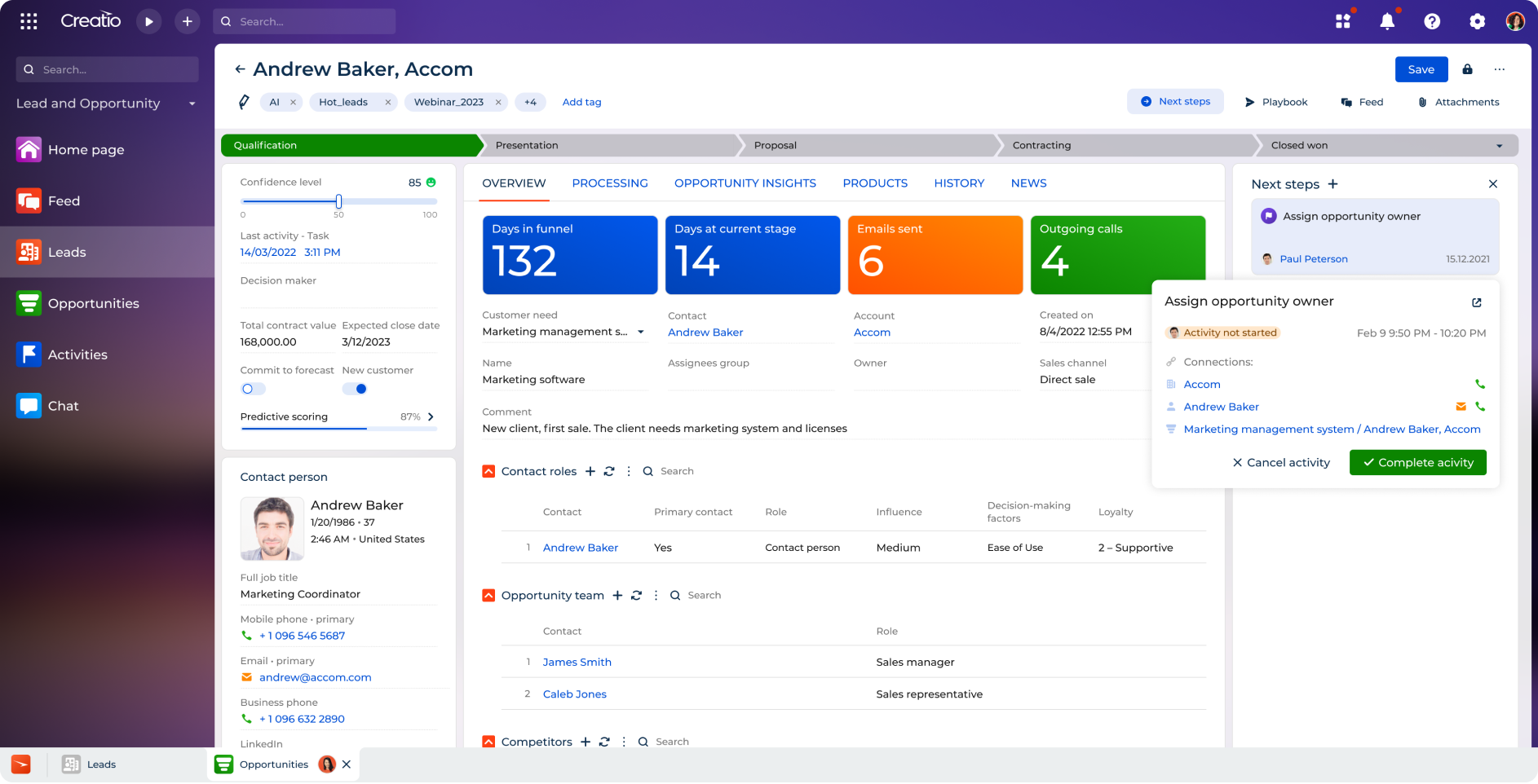
As an agentic platform, Creatio leverages autonomous AI agents to execute and optimize end-to-end business processes. These AI agents automate lead scoring, case routing, sales forecasting, content generation, pipeline analysis, and much more, with minimal human input. Creatio’s AI agents also support human employees by finding relevant client details, policy information, recommending next-best actions, and helping make data-driven decisions. This allows teams to streamline operations, respond faster to customers, and focus their time on high-value work rather than routine tasks.
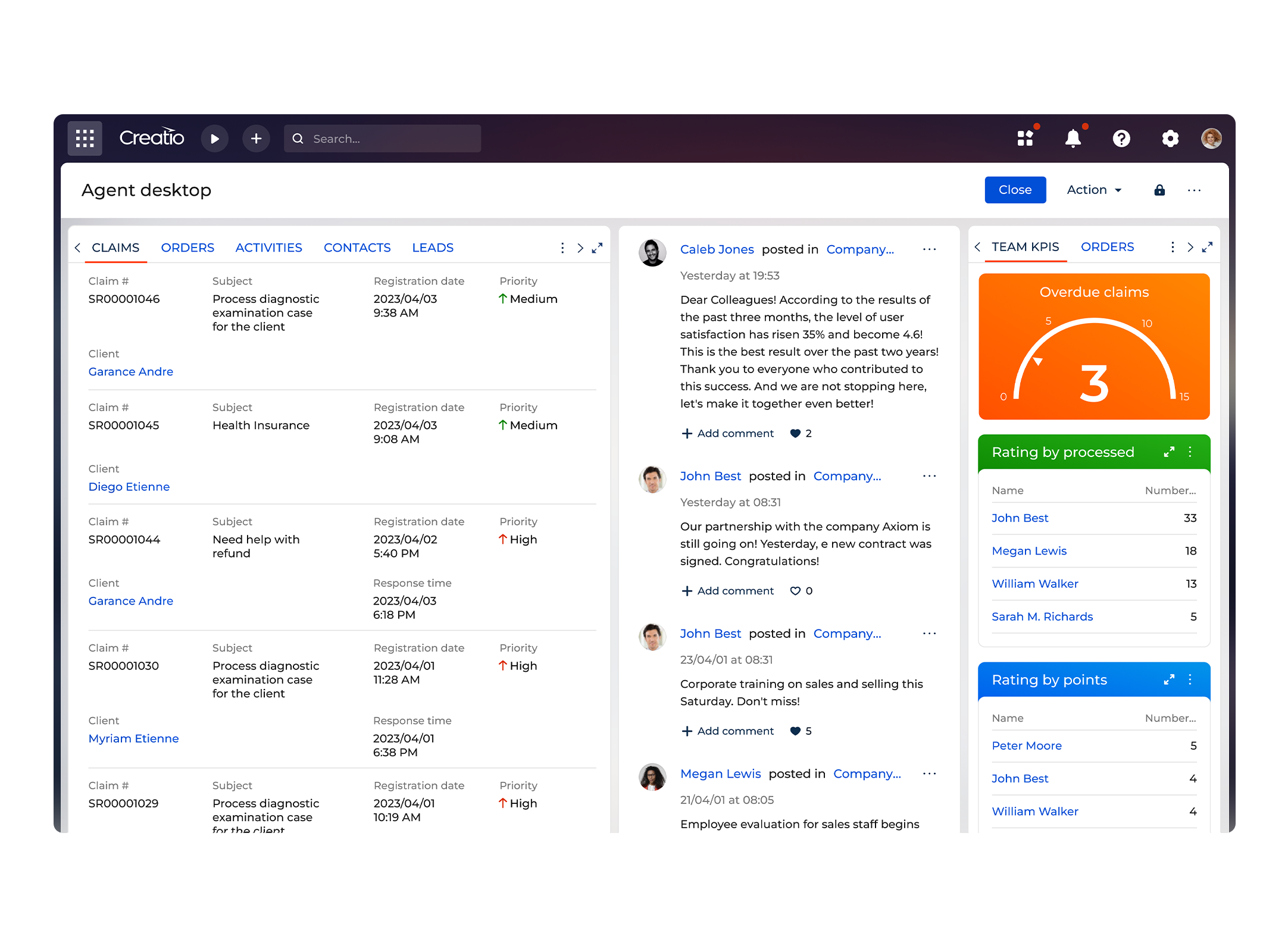
Creatio offers a comprehensive set of insurance-specific features, including:
- Underwriting and verification tools enable quick access to the full insurance application data and utilize flexible checklists and automated review/approval workflows to streamline underwriting processes.
- Document management features allow users to keep a well-organized, transparent document system.
- Claims lifecycle management helps to supervise end-to-end claim lifecycle, from detailed investigations to precise appraisals.
- Policy administration enables the seamless, centralized management of policies.
In addition to that, Creatio's Marketplace provides more than 700 integrations, allowing you to connect other software you may use, for example, for billing and communication, accounting software, etc.
Overall, Creatio is a great choice for an end-to-end insurance CRM that covers the entire customer journey and automates insurance-specific processes.
Pricing
Creatio stands out with its unique composable pricing model that allows you to purchase its sales, service, and marketing automation products unbundled. The pricing for the core no-code platform starts from $25 per user/month and then you can pay $15 each for Sales, Marketing, and Service products.
2. Salesforce
Salesforce is a CRM platform that offers a broad set of sales and marketing automation capabilities. Its Financial Services Cloud includes functionality tailored for insurance organizations, such as claims tracking, service enhancements, mergers and acquisitions support, and RFP submission.
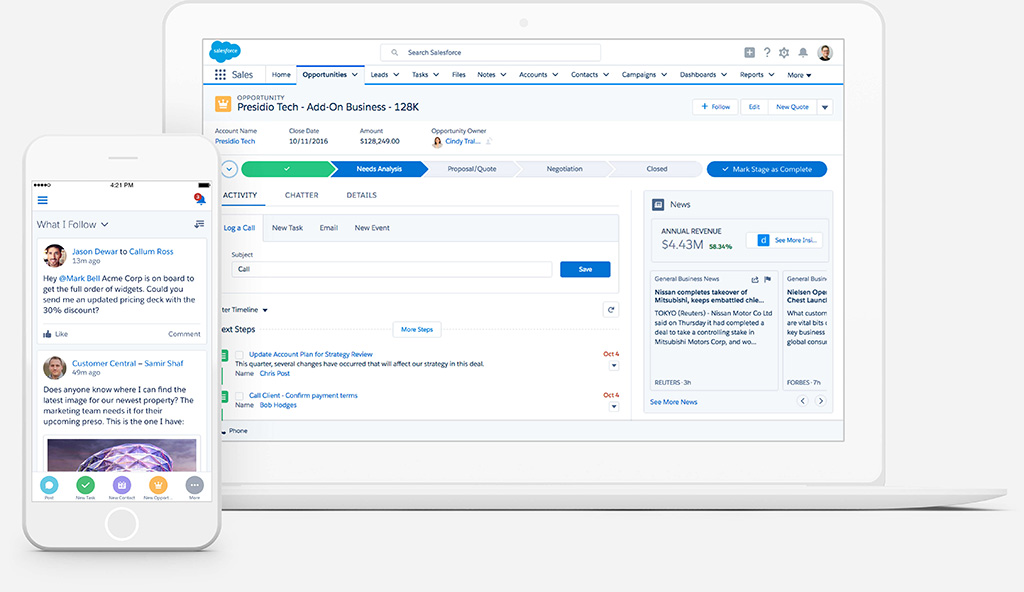
The platform uses data-driven automation and analytics to support insurance-related processes, including claims handling, billing operations, risk analysis, and customer propensity modeling. Salesforce also provides tools for managing customer data and communications across multiple channels through a centralized customer view.
As a legacy CRM vendor, Salesforce is often selected by insurance companies that already rely on its products; however, adopting Salesforce comes with a steep learning curve, high licensing costs, and a reliance on additional products or custom development to support insurance-specific use cases. It also requires ongoing IT support to tailor and maintain the system, and some capabilities, such as AI-powered tools, are only available in the highest pricing tiers or as add-ons, which further increases the cost of ownership.
Pricing
The CRM entails sales and customer service and costs $325 per user/month. Access to AI-powered features requires an additional upgrade, increasing the cost to $750 per user per month. In addition to that, you can purchase insurance-specific products for claim management and policy administration for $27 000 and $42 000, respectively.
See also: Salesforce Alternatives & Competitors and Salesforce Marketing Cloud Alternatives & Competitors
3. Pipedrive
Pipedrive is a CRM designed to strengthen customer relationships, automate operations, and support data-driven decision-making.

Pipedrive provides a unified platform for managing customer communications across various channels such as email, phone, and live chat. This integration ensures a seamless experience for customers and agents alike, enhancing overall operational efficiency and service quality. the platform's sales automation capability and the enforcement of rules to meet service-level agreements (SLAs) further streamline operations and optimize productivity.
Automated renewals are a key aspect, streamlining the renewal process through automated follow-ups and notifications. This ensures timely renewals, contributing to consistent revenue streams. Efficient claims management is another highlight, with automation facilitating quick assignment and resolution of claims.
Its user-friendly interface and sales automation tools make Pipedrive easy to adopt for insurance agencies focused on customer-facing processes. However, the platform offers limited insurance-specific functionality and lacks native support for complex processes such as claims lifecycle management, policy administration, and advanced compliance requirements, which may require additional tools or integrations as your insurance agency grows.
Pricing
Pipedrive pricing starts at $15 per user/month for the basic functionality.
4. HubSpot CRM
HubSpot’s CRM provides tools for managing leads and supporting sales activities at every stage of the buyer’s journey. The platform includes AI-powered features that assist sales representatives with lead prioritization, activity recommendations, and engagement tracking.

For example, the platform's deal scoring system analyzes client interactions and provides personalized suggestions, enabling sales reps to guide each prospect to the next stage of the sales funnel. Plus, the platform automatically updates contact records with details from publicly available resources, while its automated personalization features help you set up high-impact outreach emails at scale.
The CRM natively integrates with other products in the HubSpot ecosystem, enabling sales, marketing, and customer service teams to manage activities from centralized dashboards with shared customer data. However, deeper functionality across these areas often requires purchasing additional HubSpot products, and the platform offers limited insurance-specific features, which may necessitate custom configuration or third-party integrations for industry-specific processes.
Pricing
HubSpot CRM has a free version. Paid plans for insurance agencies start at $90 per user per month, with an additional onboarding fee that starts at $1,470.
5. Insureio
As the first CRM system designed specifically for the insurance industry on that list, Insureio is a feature-rich software that streamlines marketing and leads management. Its primary focus is on empowering life insurance agents by reducing administrative burdens and providing specialized insurance management tools, enabling them to prioritize their sales pipelines more effectively.
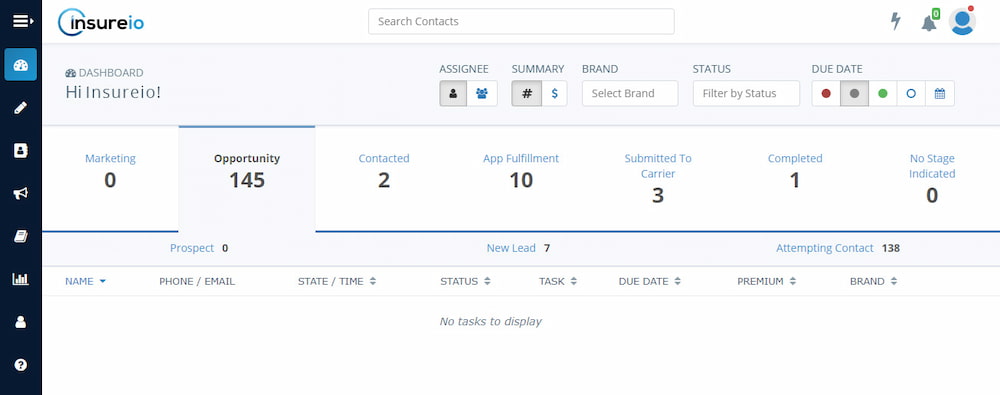
Insureio's insurance CRM key features include robust lead and client information management capabilities, ensuring that agents can efficiently track and nurture prospects throughout the sales process. It also offers comprehensive automation tools for sales and marketing activities, including a variety of sales and marketing templates.
Additionally, Insureio's application workflow and approval automation functionalities play a crucial role in expediting the insurance application process, leading to quicker approvals. However, this CRM doesn't offer comprehensive customer service features, so it can't automate the entire customer journey.
Look into Insureio if your insurance agency is looking for a powerful, purpose-built insurance CRM software with a focus on lead management.
Pricing
Insureio's pricing starts at $25 per month.
6. Zoho CRM
Zoho CRM offers a range of key features designed to enhance efficiency and productivity for insurance professionals.
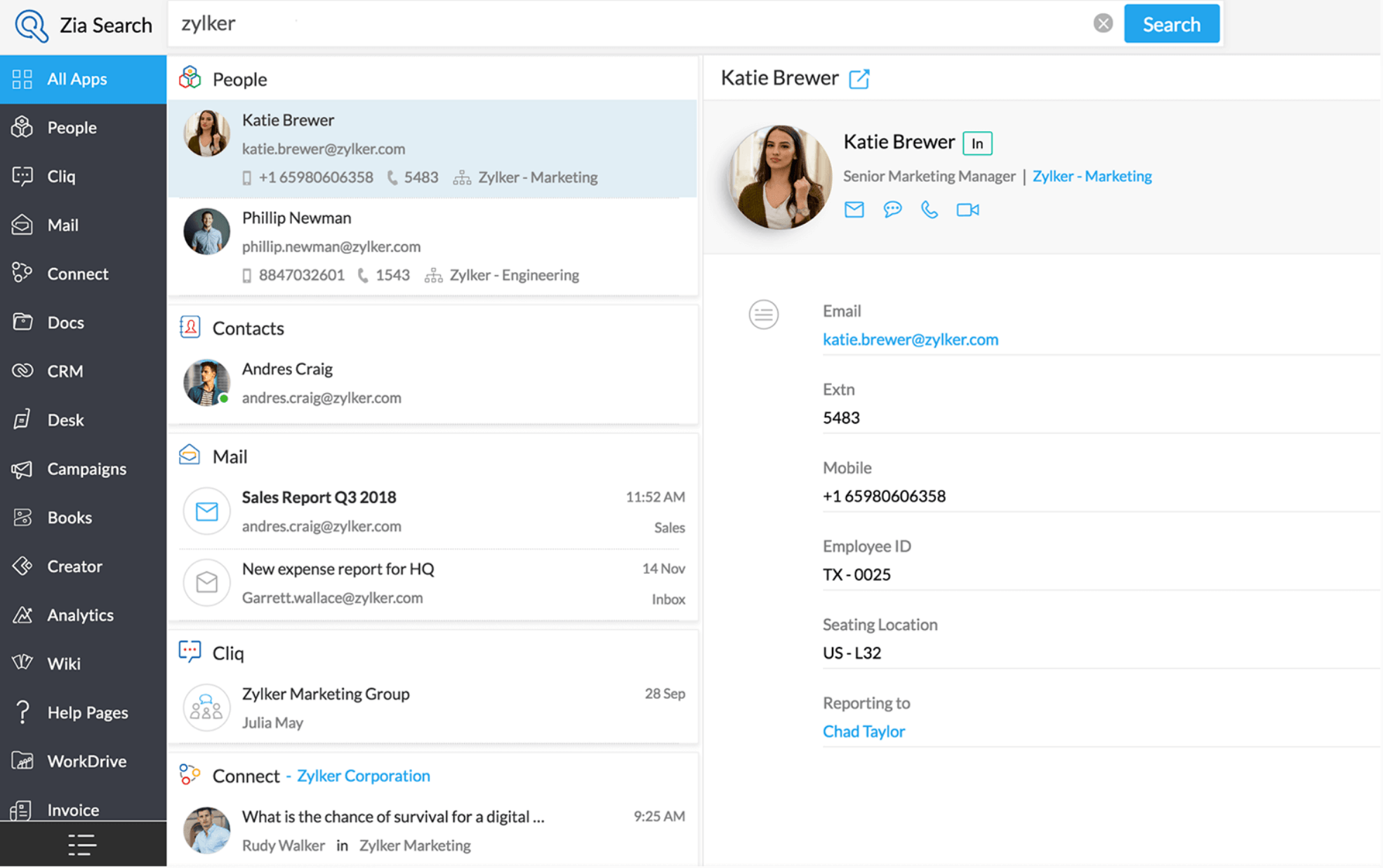
One notable feature is its lead management tools, allowing users to capture leads, automate lead scoring, and identify leads with high conversion potential. This streamlined lead management process enables sales agents to focus their efforts on the most promising leads, increasing overall sales effectiveness.
Another crucial aspect of this CRM for insurance agencies is its efficient deal management capabilities. Agents can track deals at various stages, from initial contact to closure, and seize opportunities at the optimal moment for maximum success.
This CRM software also incorporates AI-powered features, such as its assistant Zia, which offers lead and deal predictions. These predictive insights simplify decision-making for the sales team, allowing them to make informed decisions and prioritize their efforts effectively. However, Zoho CRM offers limited out-of-the-box insurance-specific functionality, and supporting complex processes such as claims management or policy administration often requires significant customization or the use of third-party products.
Pricing
The pricing for Zoho CRM starts at $23 per user/month.
7. FiveCRM
FiveCRM is a customizable CRM for insurance agencies that helps insurance brokers strengthen client relationships. The software streamlines lead management, policy handling, and claims processing, ensuring smooth workflows and heightened efficiency.
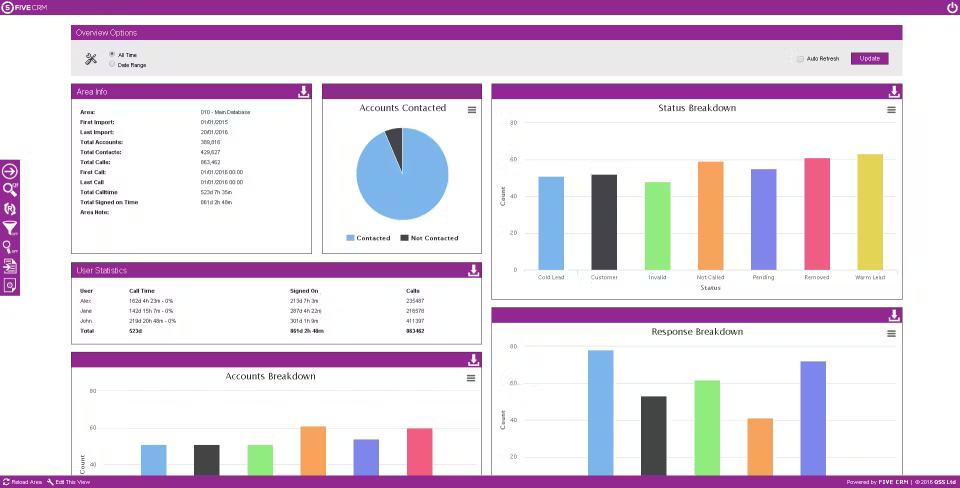
One of the key features of FiveCRM is its robust sales pipeline management capabilities. Users can visualize and manage the entire sales process, from lead generation to policy issuance, ensuring that opportunities are tracked and nurtured effectively. Additionally, FiveCRM offers a Sales Velocity feature that allows life and health insurance agents to monitor the speed at which leads move through the sales pipeline. By identifying bottlenecks and areas for improvement, users can optimize their sales processes, accelerate deal closures, and boost overall sales performance.
FiveCRM's reporting and analytics tools offer valuable insights into customer behavior, empowering users to identify cross-selling and upselling opportunities and optimize their sales strategies accordingly.
Pricing
FiveCRM's pricing starts at $65 per user/month.
8. Insly
Insly stands out among insurance CRMs because it primarily offers low-code business automation software for insurance companies that includes some CRM features.
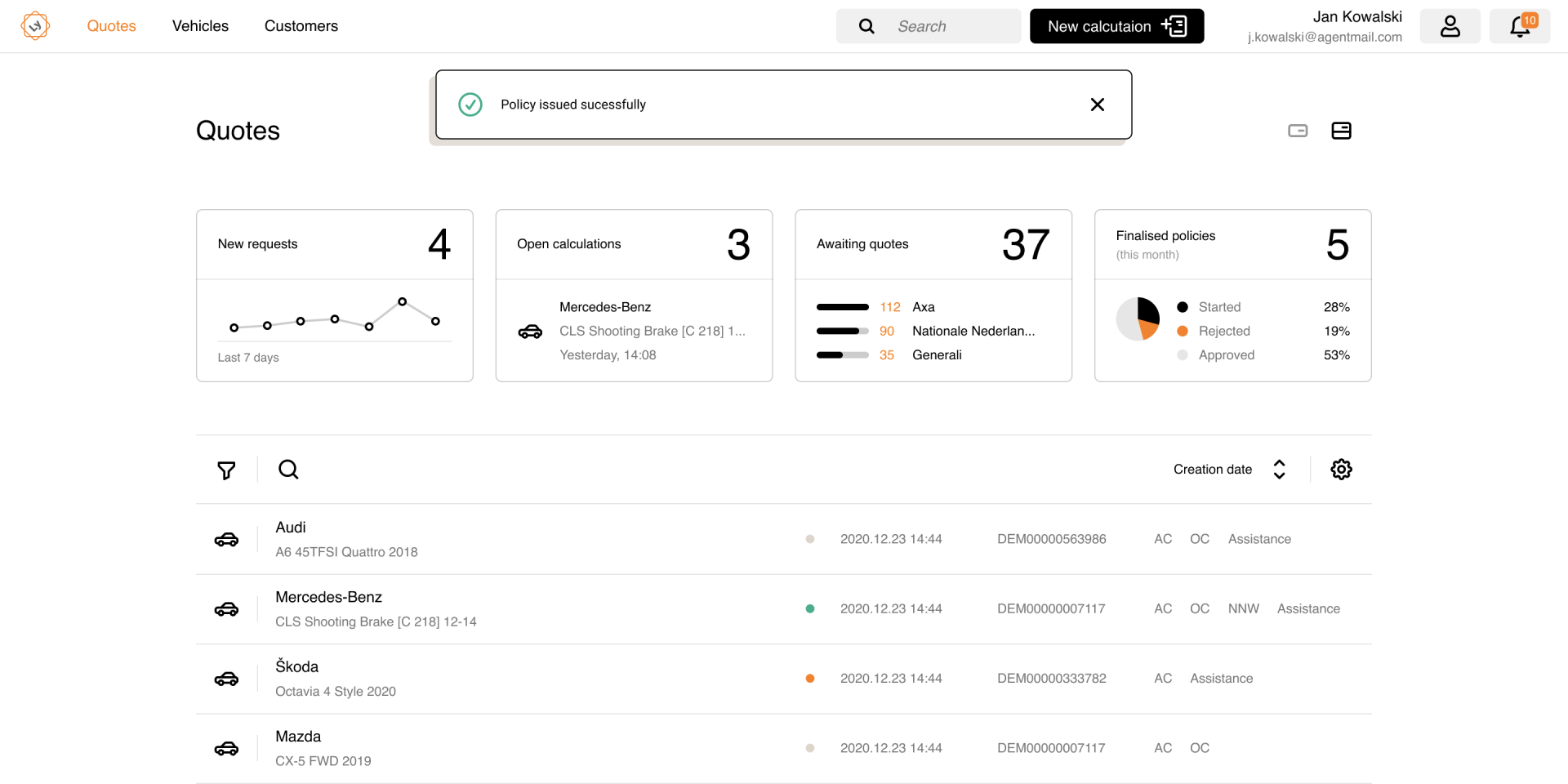
One of Insly's standout features is its no-code/low-code product builder, empowering insurance companies to make quick and easy modifications to their products. With this tool, users can customize forms, workflows, documents, and other product features without extensive technical expertise. This flexibility enables companies to adapt to changing market demands, improve operational efficiency, and deliver tailored solutions to their clients.
Additionally, Insly offers a portal for insurance brokers that simplifies product distribution processes. Through online applications, broker access, and integration with partners' systems, the platform facilitates seamless collaboration and communication between stakeholders.
This CRM software for insurance agencies is versatile and suitable for various entities in the insurance industry, including insurers, MGAs, brokers, and TPAs. Whether used as a standalone solution or integrated with third-party systems, it can seamlessly fit into your existing tech infrastructure.
Pricing
The pricing is available on request.
9. AgentCubed
AgentCubed is a cloud-based CRM software tailored specifically for the insurance industry, aiming to streamline workflows and optimize sales processes for insurance brokers.
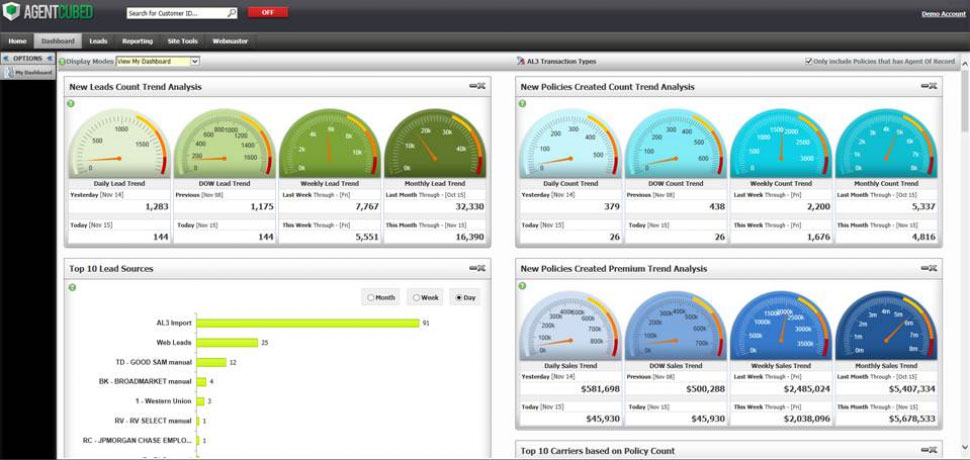
Its core functionality includes efficient lead routing, which ensures prompt distribution of leads to sales teams, resulting in improved response times and enhanced customer engagement. Additionally, the platform simplifies policy and renewal management, empowering insurance companies to efficiently handle client policies and renewals.
AgentCubed's CRM for insurance companies offers advanced features such as evaluating sales performance, managing and monitoring customized proposals, and automating sales and marketing communications. These capabilities equip insurance companies with the tools they need to optimize their sales strategies, deliver personalized customer experiences, and drive business growth in a competitive market.
Pricing
The pricing is available on request.
Most Important CRM Features for Insurance Agents
To choose the best insurance agency CRM software for your company, prioritize the following features:
Claims processing and lifecycle management
Claims processing is one of the most critical capabilities of an insurance CRM software. The system should support the full claims lifecycle, from initial submission and documentation to investigation, review, decision, and settlement. Built-in workflows help standardize how claims are handled across the company, automating task assignments and handoffs, tracking claim statuses, and ensuring timely follow-ups.
Policy administration
Insurance CRMs should include policy administration features that enable centralized management of policies throughout their lifecycle. This includes policy creation, updates, renewals, endorsements, and cancellations.
Underwriting and risk assessment
Underwriting functionality supports the verification of insurance applications. Insurance CRMs provide automated review, risk management, and approval workflows, configurable checklists, and access to client data, documents, and third-party sources.
Insurance CRMs also support underwriting decisions with detailed analytics, AI-powered predictive scoring, and intelligent next-best-action suggestions to approve, postpone, deny, or adjust final terms.
Document management
Insurance operations rely heavily on documentation, including applications, policies, claims files, and compliance records. A robust insurance CRM software provides document management capabilities, including centralized storage, version control, secure access, and automated document generation.
Governance, compliance, and security
Protecting customer data and adhering to compliance regulations are critical in the insurance industry. A robust CRM for insurance agents must support role-based access controls, audit trails, and data governance policies to protect sensitive client information. Compliance with industry regulations ensures data integrity, reduces risk, and builds trust with customers and regulatory bodies alike.
Mobile CRM for insurance agents
Mobile CRM access is essential for insurance agents working remotely or in the field. A mobile-friendly CRM allows agents to view customer records, update opportunities, manage tasks, and respond to inquiries in real time.
AI agents and intelligent automation
Modern insurance CRM systems leverage AI agents to support and automate operational and customer-facing processes. These intelligent agents analyze data, score and route leads, manage workflows, assist with client interactions, and monitor pipelines. By operating across sales, marketing, and service processes, AI agents continuously support decision-making and execute routine actions within the CRM system.
How to Choose Insurance CRM Software?
Choosing the right insurance CRM involves several key considerations to ensure it aligns with your business needs and objectives. Here are some tips to help you make an informed decision:
- Identify your business needs - determine what features are essential for your insurance company, such as underwriting, policy administration, claims processing, customer service tools, integrations, mobile access, compliance capabilities, etc.
- Evaluate customization capabilities - choose an insurance CRM system that supports flexible configuration, including custom fields, workflows, dashboards, reports, and user interface, ideally with no-code tools, so your business users can easily customize your CRM of choice.
- Assess customer support and training - look for a CRM provider that offers reliable customer support, training resources, and user-friendly documentation. Ensure they provide adequate onboarding assistance and ongoing support.
- Consider scalability - select a CRM system that can grow with your business by supporting additional users, higher data volumes, and evolving business needs.
- Check integration capabilities - review how the CRM connects with your existing systems, such as marketing automation, accounting software, etc., whether through API, prebuilt connectors, or data sync, and evaluate the vendor’s marketplace for ready-made solutions.
- Prioritize insurance expertise - choose vendors with proven experience in the insurance industry, backed by customer case studies, references, and real-world examples of insurance CRM implementations.
- Evaluate total cost of ownership - make sure you understand the full pricing structure, including subscription fees, implementation costs, onboarding and training expenses, customization or add-on charges, and any costs for future upgrades or additional users.
Summary
Investing in the right insurance CRM software is vital for insurance agents to effectively manage client relationships, streamline operations, and drive business growth. A robust CRM solution empowers insurance companies with actionable insights, automation capabilities, and personalized communication tools.
With seamless integration, endless customization options, robust analytics, and intelligent AI agents, Creatio offers a compelling solution tailored to meet the diverse needs of businesses like yours. Request a free demo to discover how Creatio CRM can transform your customer relationships.





















































